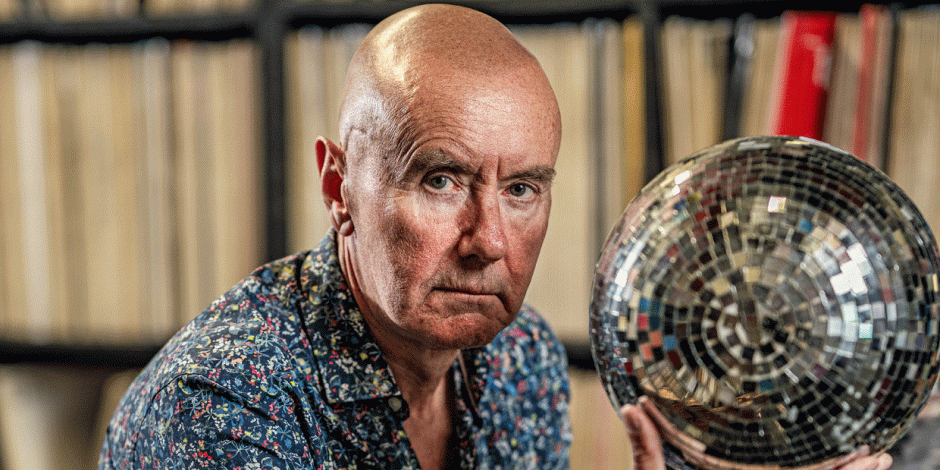Starten Sie den Audio-Text
Mit dem Audio-Player können Sie sich den Text anhören. Darunter finden Sie das Transkript.
Transcript: Beyond “Trainspotting”
Melita Cameron-Wood: Do you think the Edinburgh from Trainspotting still exists today?
Irvine Welsh: I think in some ways it exists much more prolificallystarkprolifically and much more extreme than it did. There’s not the street culture that was in Trainspotting, but I think in terms of people’s groups, their mental health and their peer groups, I think it’s much more of an addiction society now than there was back then. I mean, everything’s set up for addiction now. It’s all online. It’s the mobile phone, basically, that’s the driver of it: gambling, pornography, fast food delivery, prescriptionärztliches Rezeptprescription drugs and all. Everything is geared for sth.auf etw. ausgerichtetgeared for addiction now, and it’s facilitate sth.etw. ermöglichen, erleichternfacilitated by the mobile phone, by the screen largely. It’s quite private and its anonymous, but it’s really all encompassingumfassendencompassing. So, I think we’re in a much more extreme position now than we were back then.
Melita: And when you walk around Edinburgh today, are there places where you sort of, like, began writing the book Trainspotting, or, like, where you first got some inspiration? Like, places that aren’t necessarily in the film, but, like, places that for you have a personal significance.
Irvine: Yeah, I mean all of Leith and Grant and Pilton, Muirhouse, you know, where I grew up and went to school. That whole strip along the Forth Estuary in the north of Edinburgh has kind of great resonancehier: Bedeutungresonance to me. It’s, like, you know, all the places there, the pubs and the cafés, they leakausströmen; hier: widerspiegelnleak all that sense of who I am. Like every person is formed by their childhood and their early adult experiences. And after that, you’re just incrementallyschrittweise, nach und nachincrementally adding little bits and piecesDetailsbits and pieces but, you know, the cruxKern, entscheidender Punktcrux of who you are is formed then. And I think it’s the same as a writer. So you go back to these places that you, you know, not so much go back, I mean, I’ve never left them really. It’s like, you go to, if I go down there, if I got to a Hibs (Hibernian Edinburgh)schottischer FußballvereinHibs game, which I still do because I’ve got a season ticket, and if I go to the, you know, down to the Dockers Club in Leith, go to some of the pubs that I drink in, then I just feel instantly kind of at home in a way. This is a terrain that I understand. And even if I’m writing, I mean, I’ve just finished a book that’s set in Las Vegas, a suburb in Las Vegas, and it’s an intergenerationalgenerationenübergreifendintergenerational family saga, but so much of it is still inform sth.hier: etw. prägeninformed by me and by the places that I’ve come from, the places I’ve written, and the characters that I have known, and obviously they’re Americanized or they’re put into a different place, or they’re given these different cultural references and all that, but the energy of it’s informed by all that.
Melita: And I saw that you also work as a DJ. How does that influence your writing?
Irvine: I think that, you know, initially very much. I was be immersed in sth.in etw. eingetaucht sein; etw. intensiv betreibenimmersed in acid house and the clubs scene and all that, and I think you get into that 4/4 beatVier-Viertel Takt4/4 beat. [It] becomes such an important thing and it’s almost imbuedurchdringenimbued kind of deep into you. I wanted to get that or I actually found myself bringing that into literature through that performative kind of Celtic language basically and getting these beats and then trying to experiment with typography as the effects on top of the beats. So really, really quite fundamental.
Melita: And do you think your writing style has evolvesich entwickeln, verbessernevolved much over the years? Like, say if you compare Trainspotting and, like, Men in Love or like other books that you’ve written, can you see a transitionWandeltransition?
Irvine: I think in some ways, yeah. I mean, I just, if you do something, you get kind of better at it in a lot of ways, but maybe a bit more polishedausgefeiltpolished at it. But I think that there’s a difference between Trainspotting and Men in Love. And I think between Skag Boys and Trainspotting. Trainspotting is more chaotic and immediate because it has to be, ’cause you’re right into, you’re into a lifestyle of hardcore heroin addicts. Like, so it has been kind of quite chaotic and in Men in Love, they’re kind of tentativelyvorsichtigtentatively sorting themselves out. So, there’s still elements of that, residueRestresidues of that chaos, but they’re beginning to order their lives a little bit. Skag Boys, it starts off quite ordered and then as their lives start to fall apart it moves into the Trainspotting territory. You know, it mirrors the characters. I mean, I think Spud and Begbie are still in Leith, so they’re very much, they’re still very much in that world in a lot of ways. Whereas Renton and Sickboy have moved into different worlds and I think their kind of speech patterns and their interactions reflect that a little bit.
Melita: Yeah. And when you first saw the film, Trainspotting, did you feel like it reflected the book?
Irvine: You know, I was just delighted with the film and still am, you know, it’s a great piece of cinema still, it’s great piece of independent cinema and it really, it’s very rare that you get an acclaimedvon der Kritik gefeiert, erfolgreichacclaimed book and an acclaimed film coming from it. You know, there’s always things that could go wrong, but I think what it did is it respected both the original material in the book but also respected cinema as a different art form to the novel. And I think that was the key to the success of it.
Listen to the full interview on Spotlight Audio 14/25.



